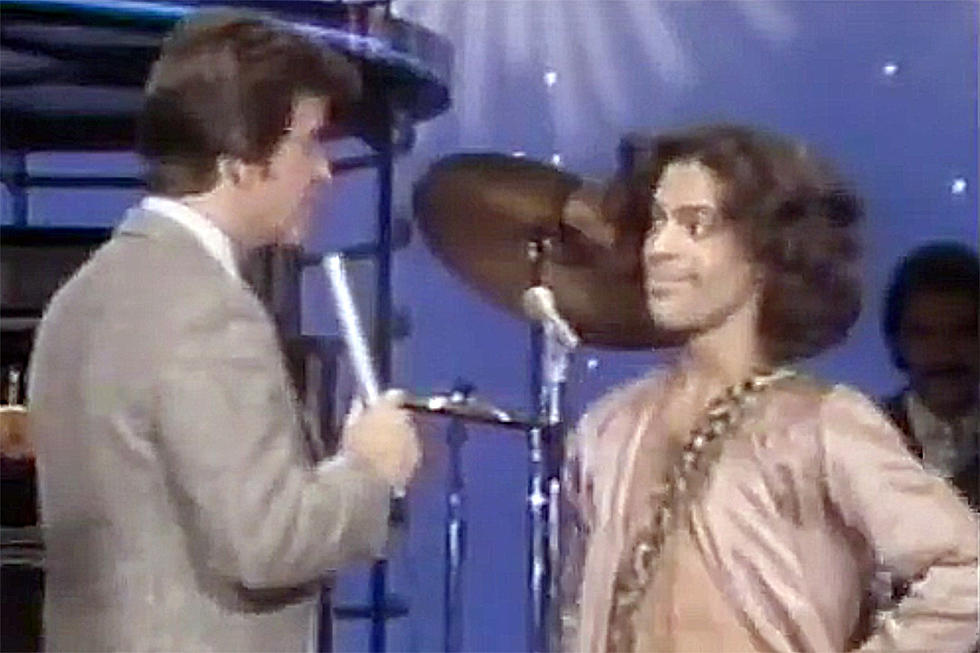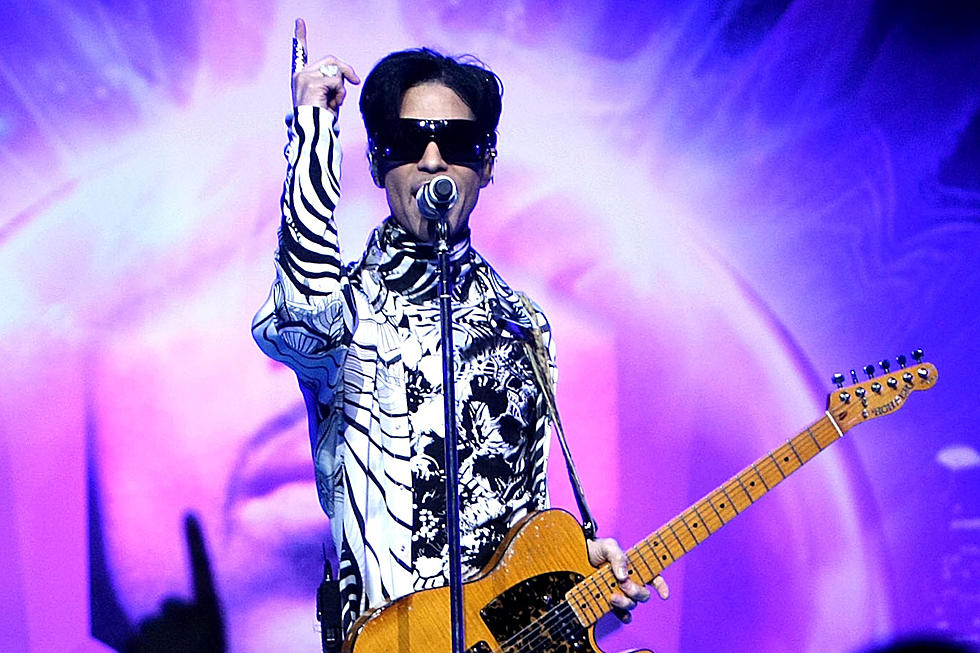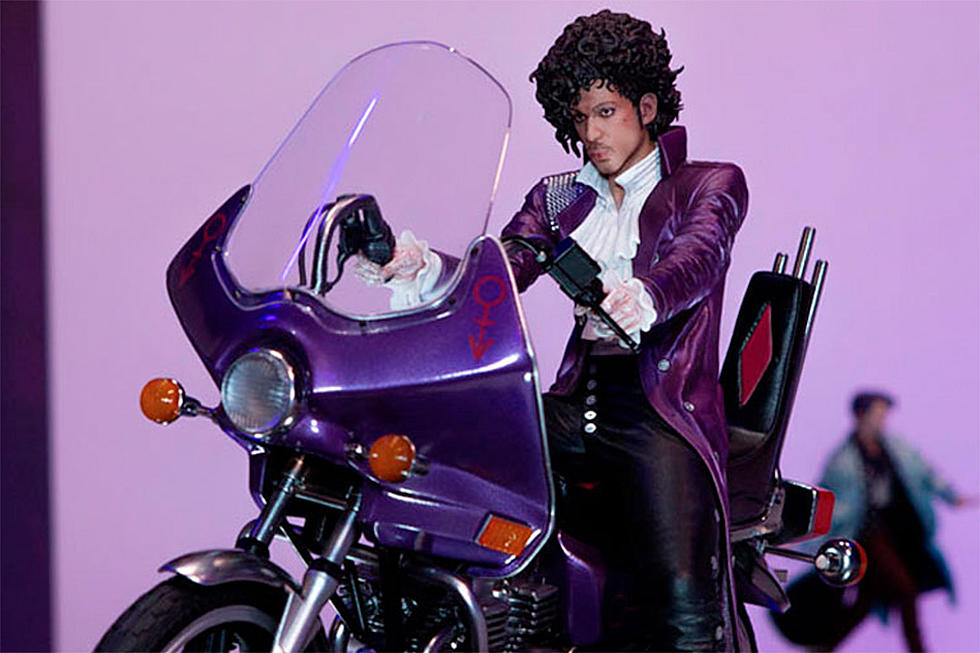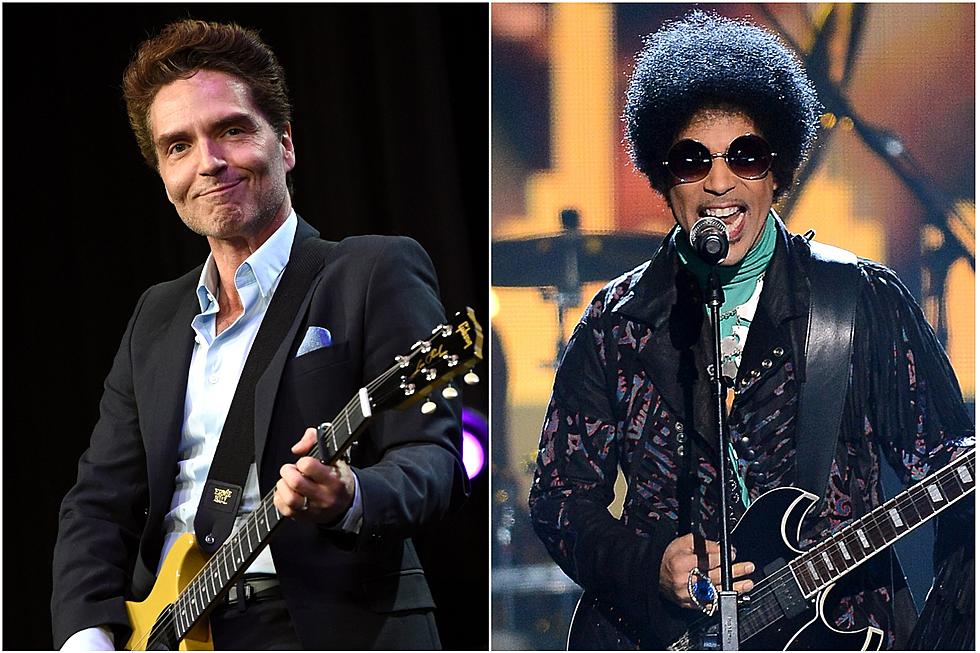
40 Years Ago: Prince Messes With Dick Clark on ‘American Bandstand’
American Bandstand was a big deal for any artist in Prince’s position in 1979. In December of that year his self-titled second album had been on sale for two months and he needed the kind of mainstream coverage the revered TV show and its host, Dick Clark, offered.
On Dec. 16, Prince, Dez Dickerson, Andrew Cymone, Matt Fink, Gayle Chapman and Bobby Z. set up at Stage 55 in ABC’s Television Center Studios in Hollywood, and prepared for their first TV appearance. They recorded a performance of the new LP’s opening track, “I Wanna Be Your Lover” – so far, so good. Things went less well when Clark went to interview the bandleader.
After making a comment about how surprising it was that such music could come out of Minneapolis, which drew a confused and surprised expression from a then 19-year-old Prince, Clark asked him to introduce his band, which he did. Then Clark asked about his early demos, and how long ago he’d made them. Instead of a vocal response, Prince held up four fingers – representing four years – and threw his hand dramatically towards the interviewer. Asked why he’d turned down the record deals that followed, Prince replied with a glam-rock flourish: “Um, they wouldn’t let me produce myself.” Did he mind that the labels doubted he knew what he was doing at the age of 15? “Don’t know.” Was he disappointed over the missed opportunity? “No.” Did he play every instrument on the new album? “Maybe.” How many instruments did he play? “Mmm… [long delay, head turned away] Thousands.” All of them? “A lot.” By that point, Clark, beginning to understand that things weren’t going to get any better, wrapped the answers to his questions into those questions. After admitting a tour was coming, Clark asked for the name of the next song. When the answer was “Why You Wanna Treat Me So Bad?” the presenter could have been forgiven for thinking the very same thing.
Prince on ‘American Bandstand’ in 1979
“He didn’t talk to me,” Clark told the Star Tribune in 1995. “I’ve always said that was one of the most difficult interviews I’ve ever conducted, and I’ve done 10,000 musician interviews.” However, he didn’t seem to bear a grudge, reflecting: “[T]hat’s the nature of the man. He’s an extraordinary performer and not a particularly verbose one in public conversation. Though once you’re off camera, he’s like everybody else – very normal.” He compared Prince to “all the mystery people in entertainment” who say little in public but much more in private. “Prince is the same… But I don’t advise him on career moves.”
The story that passed into folklore was indeed once of Prince’s infamous shyness – although some sources suggest that he’d been offended by the comment about Minneapolis. “That tripped me out when Dick Clark asked how I come from Minneapolis, of all places,” Prince said the following year. “That really gave me an attitude. TV personalities are hard to talk to. They come out of certain bags. Music is music. A place is a place.”
Despite that, Dickerson presented a different version of events – that the moment had been staged as a publicity stunt. “Dick Clark came into the Green Room and did his cordial thing: He’s everybody’s friend and puts everybody at ease,” the guitarist said. “After he left, I saw that look on Prince’s face that meant: Uh oh, something’s coming. He said, ‘This is what we’re going to do. When Dick Clark talks to you, don’t say anything.’ My heart sank.”
In Dave Hill's book Prince: A Pop Life, Dickerson recalled just how far his heart had sunk: “When I came home and saw somebody’s tape of it, I thought it just made him look foolish… I thought it made us look like total buffoons. … You know, ‘We’re illiterate, but we play well.’” He had to admit, though, that Prince had been right. “[I]t ended up being considered pure genius,” he said in an interview. “And Dick Clark talks about it to this day.”
The episode wasn’t broadcast until January 1980, which means Clark – who died in 2012 – and his production team would have had ample time to remove the silent treatment section if they’d wanted to. Perhaps it speaks of Clark’s enthusiasm for and support of an undeniably sensational talent like Prince’s – and also of his worldly-wise attitude to both artists and headlines. It almost certainly speaks of Prince’s own sense of determination and control. Looking back at the moment now, focusing on Prince’s body language performance, it’s easy to see someone fully in charge of the situation, knowing that, ultimately, everyone else has a cue to follow and that the more he misses his, the more others have to stick to theirs.
Still, at that moment in 1979, he needed American Bandstand more than the show needed him – for example, the following month, “Why You Wanna Treat Me So Bad?” would flop as a single, proving how much work was ahead of him in finding top-league acceptance. And yet, Prince made the decision to play the TV spot out the way he wanted to, rather than the way he was expected to. It was a modus operandi that many would fall foul of as the years passed.
Prince's Bandmates: Where Are They Now?
More From KSSM-FM










